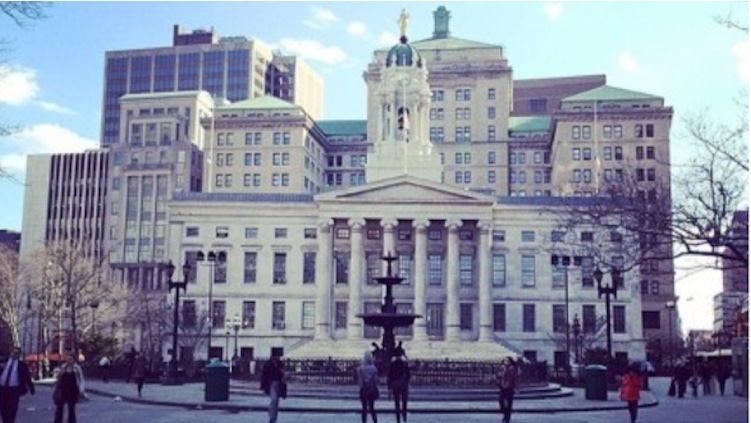New York Attorney General Urges Court to Reject Pending Petition to Sell Krishna Temple in Brooklyn
By by Jayadvaita Swami and Guru Gauranga Das | Dec 15, 2017

December 6, 2017 – New York Supreme Court for Kings County Room 525 was filled with Krishna devotees opposing a petition seeking approval of the sale of their temple in Brooklyn. Also appearing in court to oppose the proposed sale were attorneys for ISKCON’s Governing Body Commission (GBC), an attorney for the newly reconstituted Bharati Center board, and a New York Assistant Attorney General.
New York State law requires court approval of the sale of real property belonging to a religious society. Typically, a religious society desirous of selling its place of worship first seeks approval from the New York State Office of the Attorney General. If the Attorney General rejects a religious society’s petition to sell its place of worship, the seller’s sole recourse is to attempt to overturn that decision in New York Supreme Court.
That is precisely what ISKCON Bharati Center ex-president Ramabhadra Das and his fellow removed board members attempted today – after failing three times to win approval from the New York Attorney General over the last two years.
As a result, attorneys for the GBC and congregrants of the ISKCON Bharati Center filed briefs in court laying out the reasons why Ramabhadra’s petition should be denied (see sidebar titled “Why We Object”). Some fifty or more New York devotees wearing buttons with the slogan “Sell Books, Not Temples” were also present in the courtroom to show their support for keeping the temple in its present location.
The GBC had previously removed Ramabhadra Das as ISKCON Bharati Center temple president as well as all but two members of the temple’s prior board. The GBC then authorized the Brooklyn Temple Sale Committee led by its chairman Sesa Das to fill the resulting vacancies and make other needed adjustments.
The Bharati Center board members initially retained were Satya Dasi and Adideva Das. “They had served on the board for many years,” said Sesa Das, “so the Committee wanted to give them a chance to cooperate and continue as loyal ISKCON members.” However, when the first meeting of the newly reconstituted Bharati Center board was held, neither Satya nor Adideva chose to appear even though they had been personally invited. As a result, the newly reconstituted Bharati Center board voted to remove them and elected two new board members in their place.
The newly installed chairman of the ISKCON Radha Govinda Temple a/k/a Bharati Center is Vaisesika Das, and its vice-chairman is Caitanyananda Das, a lifelong New Yorker and congregational member. Pyari Mohan Das, ISKCON regional secretary for New England, is also a board member. The remaining board members are ISKCON Bharati Center congregants living in New York and New Jersey.
Perhaps the most significant event to occur at the court proceeding was the filing by the Attorney General’s Office of its own objections to the proposed sale. The Attorney General’s Office argued for the rejection of Ramabhadra’s “plan” for the construction of a newer and better temple. In fact, the Attorney General’s Office observed that the sale petition did not contain much of a plan.
As Assistant Attorney General Abigail B. Young stated in a sworn affidavit of objection to Bharati Center’s Petition, “it is unusual in a transaction of this nature involving a sale of a large and active religious corporation not to set forth a clear plan to move religious artifacts and establish a transitional house of worship as well as clear outlines for the development of a permanent new house of worship with proceeds. We would ask that the Court reject the Petition until Petitioner can provide such a plan approved by all internal bodies.”
The Assistant Attorney General’s reference to “all internal bodies” also appears significant. ISKCON’s highest internal body, the GBC, has unambiguously rejected the proposed sale of the Radha-Govinda Temple a/k/a Bharati Center.
With the GBC, the newly reconstituted Bharati Center board, a majority of the ISKCON Bharati Center congregation and the New York State Office of the Attorney General firmly opposed to the sale, the prospect of Ramabhadra’s winning Court approval seems less promising than ever.















